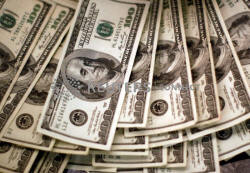Riskier currencies maintain gains vs dollar on Biden
election win
 Send a link to a friend
Send a link to a friend
 [November 09, 2020] By
Olga Cotaga [November 09, 2020] By
Olga Cotaga
LONDON (Reuters) - The dollar stabilised on
Monday after tumbling to a 10-week low in the wake of Joe Biden's
election as U.S. president with euro/dollar - the most traded currency
pair in the world - holding below $1.19 and the Japanese yen remaining
close to an eight month high.
Scandinavian currencies and the Australian dollar - all very sensitive
to international trade developments and investors' risk appetite - were
stronger.
The Chinese yuan was the biggest mover among major currencies, having
struck a 28-month peak of 6.5501, and last trading up 0.6% at 6.5545.
The Norwegian crown was not far behind, rising by 0.5% against the
dollar to 9.1135, after hitting a seven-week high of 9.1020. The Swedish
crown was also up by 0.4% at 8.6160, after reaching a 10-week high of
8.6100 before.
"It's classic risk preference, risk-on, higher asset prices across the
board - stocks, commodities - and it's going to the foreign exchange
market," said Neil Jones, European head of hedge fund sales at Mizuho.

"The U.S. dollar, as one would expect, is a safe-haven currency and
still the world leader in terms of outperformance in times of risk
aversion and so one would expect it to be on the backfoot in times of
risk preference," Jones said.
The market may be a little reluctant to take euro higher, he added.
The Aussie dollar rose 0.4% at 0.7286 versus its U.S. counterpart,
having hit earlier 0.7301, its highest since Sept. 21.
The euro was last trading at $1.1884, flat on the day, after rising to a
two-month high of $1.1899 in the Asian session.
German exports rose by more than expected in September, and foreign
trade gave Europe's largest economy a boost going into the fourth
quarter as it struggles to avoid slipping into a double dip contraction.
The U.S. dollar hit earlier a 10-week low as investors heralded Biden's
election win by buying trade-exposed currencies on expectations that a
calmer White House could boost world commerce and that monetary policy
will remain easy.

Biden crossed the threshold of the 270 electoral college votes required
for victory on Saturday by winning the battleground state of
Pennsylvania. Republicans appear to have retained control of the Senate,
though the final makeup may not be clear until runoff votes in Georgia
in January.
[to top of second column] |

U.S. dollars are counted out by a banker counting currency at a bank
in Westminster, Colorado November 3, 2009. REUTERS/Rick Wilking/File
Photo

The U.S. dollar changed hands at 103.5 Japanese yen, up 0.2% on the day,
although the yen was close to its strongest since March.
The U.S. dollar index - which compares the greenback against a basket of
currencies - was steady at 92.21, after dropping to a 10-week low of 92.12.
Sterling hit its highest in more than two months.
"The (U.S. election) outcome is ideal from a market point of view," said CMC
Markets' chief strategist in Sydney, Michael McCarthy.
"Neither party controls the Congress, so both trade wars and higher taxes are
largely off the agenda."
The prospect of more gridlock also means that expectations for a massive U.S.
fiscal stimulus package have been lowered, which has sent bond yields down in
anticipation of less borrowing and more quantitative easing from the Federal
Reserve.
Selling of the U.S. dollar was held in check by underlying virus worries and
because Donald Trump, the first incumbent to lose a re-election bid in 28 years,
has made no sign of conceding while fighting legal battles to overturn the
result.
Traders are also wary of fresh lockdowns as coronavirus cases surge, with the
global tally of infections topping 50 million on Sunday as cases in the United
States surpassed 10 million.

Europe's fiscal and monetary responses to a second wave of coronavirus
infections, which have already prompted new restrictions on everyday life, will
be in focus when European Central Bank President Christine Lagarde speaks on
Thursday.
(This story corrects bullet point and third paragraph to show yuan was biggest
mover among major currencies)
(Reporting by Olga Cotaga; Additional reporting by Tom Westbrook in Sydney;
Editing by Toby Chopra)
[© 2020 Thomson Reuters. All rights
reserved.] Copyright 2020 Reuters. All rights reserved. This material may not be published,
broadcast, rewritten or redistributed.
Thompson Reuters is solely responsible for this content. |